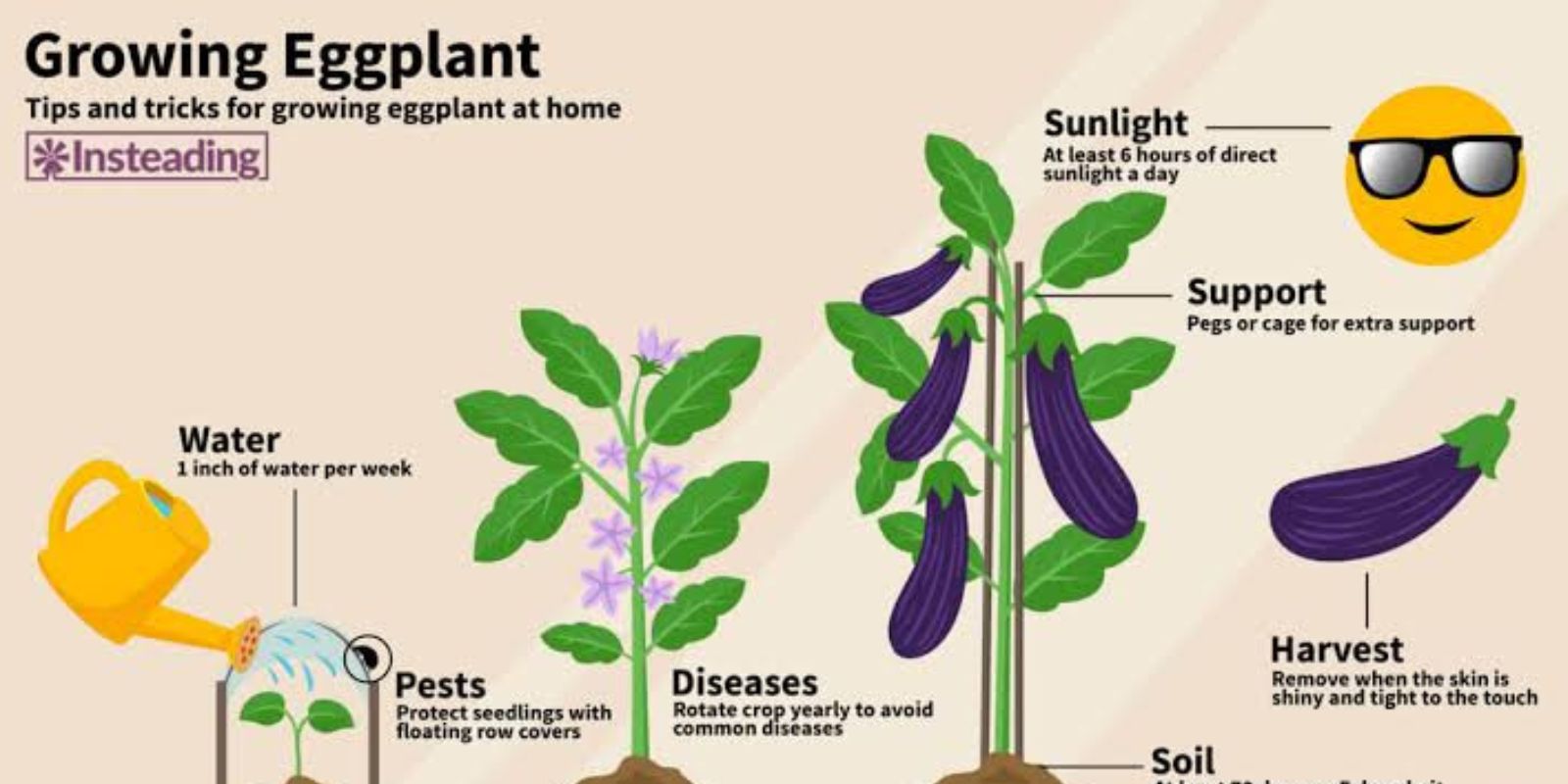Growing eggplants (also known as aubergines) in pots is a rewarding way to enjoy fresh produce from the comfort of your home. These versatile vegetables are perfect for small spaces and thrive in containers when provided with the right care. This comprehensive guide will walk you through everything you need to know about cultivating healthy, productive eggplants in pots.
Why Grow Eggplants in Pots?
Eggplants are ideal for container gardening due to their compact size and adaptability. Growing them in pots allows you to control soil quality, manage pests more effectively, and relocate plants to ensure optimal sunlight and temperature. This method is perfect for urban dwellers with limited gardening space.
Step-by-Step Guide to Growing Eggplants in Pots
1. Choosing the Right Container
Eggplants require a pot that provides ample space for root development. Opt for a container that is:
- At least 40–45 cm (16–18 inches) deep and wide.
- Equipped with drainage holes to prevent waterlogging.
Terracotta or plastic pots are good options, but ensure they are durable and weather-resistant.
2. Preparing Nutrient-Rich Soil
Eggplants thrive in well-draining, nutrient-rich soil. Here’s how to prepare it:
- Use a high-quality potting mix, preferably one designed for vegetables.
- Enrich the soil with compost, aged manure, or a balanced organic fertilizer to provide essential nutrients.
- Ensure the soil has a slightly acidic to neutral pH (between 5.8 and 6.5).
3. Selecting the Right Eggplant Variety
Choose a variety suited for container gardening, such as:
- ‘Black Beauty’: A classic variety known for its large, glossy fruits.
- ‘Little Fingers’: Compact plants producing slender, tender eggplants.
- ‘Fairy Tale’: A dwarf variety with attractive striped fruits.
4. Planting Eggplants
- Start with Seeds or Seedlings: You can grow eggplants from seeds indoors or purchase young seedlings from a nursery.
- Planting Depth: Sow seeds about 1 cm (0.4 inches) deep or plant seedlings so the soil covers the base of the stem.
- Spacing: If planting multiple eggplants in a large container, space them at least 45 cm (18 inches) apart.
5. Providing Adequate Sunlight
Eggplants are sun-loving plants and require at least 6–8 hours of direct sunlight daily. Place the pot in a sunny location, such as:
- A south-facing balcony or terrace.
- A spot with full morning sun and partial afternoon shade in hotter climates.
6. Watering Consistently
Eggplants need consistent moisture to thrive, but overwatering can lead to root rot. Follow these tips:
- Water deeply, ensuring the soil remains evenly moist but not soggy.
- Allow the top inch of soil to dry slightly between waterings.
- Use mulch to retain moisture and regulate soil temperature.
7. Fertilizing Regularly
Eggplants are heavy feeders and benefit from regular fertilization:
- Frequency: Apply a balanced fertilizer every 2–3 weeks.
- Type: Use a fertilizer high in potassium and nitrogen, such as a liquid vegetable feed or organic compost tea.
- Timing: Fertilize during the active growing season, especially when the plant starts flowering and fruiting.
8. Supporting the Plants
As eggplants grow, their fruits can become heavy and cause the stems to droop. Provide support by:
- Using stakes or tomato cages to keep the plant upright.
- Gently tying the main stem to the support structure with soft garden ties.
9. Controlling Pests and Diseases
Common issues affecting eggplants include aphids, spider mites, and flea beetles. Protect your plants by:
- Inspecting leaves regularly for signs of pests.
- Using organic pest control methods, such as neem oil or insecticidal soap.
- Ensuring good air circulation to prevent fungal diseases like powdery mildew.
10. Pruning for Productivity
Pruning helps focus the plant’s energy on fruit production. Follow these steps:
- Remove lower leaves and small, weak stems to improve airflow.
- Pinch off excess flowers to direct energy toward developing larger fruits.
- Trim damaged or diseased parts promptly.
11. Monitoring Temperature
Eggplants grow best in warm conditions, with temperatures between 21–30°C (70–86°F). If you live in a cooler climate:
- Move pots indoors during cold nights.
- Use a cloche or mini greenhouse to maintain warmth.
12. Harvesting Eggplants
Harvesting at the right time ensures the best flavor and texture:
- Look for fruits that are glossy, firm, and fully colored.
- Test ripeness by gently pressing the fruit; it should feel slightly soft.
- Use pruning shears or a sharp knife to cut the fruit, leaving a small portion of the stem attached.
Troubleshooting Common Issues
- Yellowing Leaves: Indicates overwatering or nutrient deficiency.
- Blossom Drop: Caused by temperature stress or inadequate pollination.
- Small Fruits: Result from insufficient sunlight or poor soil fertility.
Benefits of Growing Eggplants in Pots
- Space Efficiency: Perfect for small gardens or balconies.
- Control: Easier to manage soil, water, and pests.
- Convenience: Portable pots allow you to adjust to changing light and weather conditions.
Frequently Asked Questions
Q: Can I grow eggplants indoors?
Yes, as long as you provide sufficient light using grow lights and maintain warm temperatures.
Q: How many eggplants can one plant produce?
Each plant can yield 4–6 fruits per harvest, depending on the variety and care.
Q: Can eggplants grow in the same pot as other plants?
Yes, eggplants pair well with companion plants like basil, marigolds, or peppers, which deter pests and improve soil health.
Conclusion
Growing eggplants in pots is a simple yet rewarding endeavor that offers fresh produce for your table. With proper care—adequate sunlight, consistent watering, and regular fertilization—you can enjoy a bountiful harvest of delicious, homegrown eggplants. Whether you’re a seasoned gardener or a beginner, this guide equips you with everything you need to succeed.
Ready to start your eggplant-growing journey? Share your progress and tips in the comments below!

